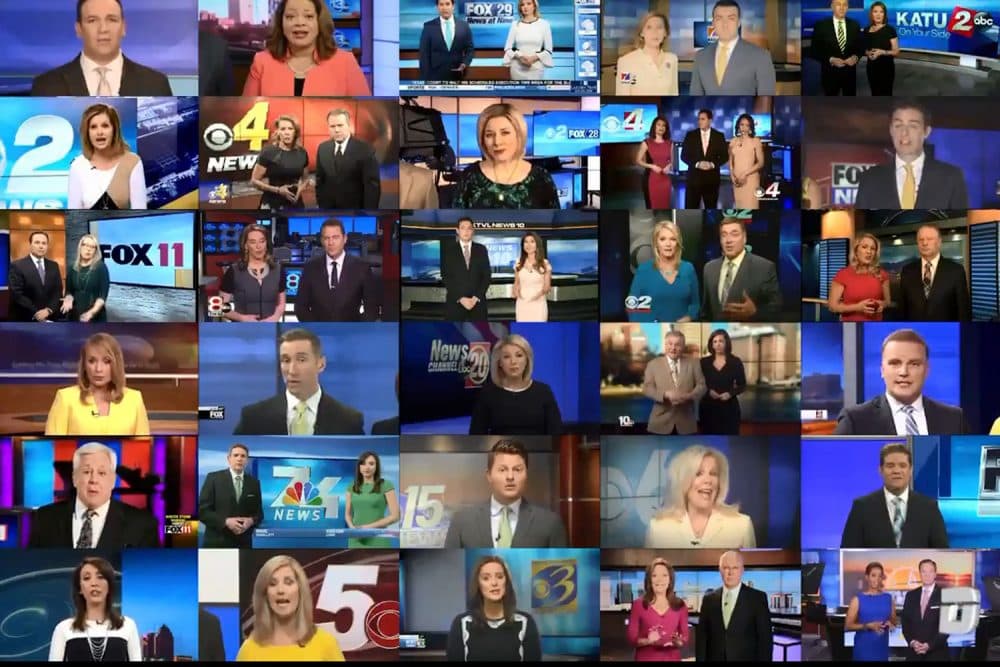Advertisement
Sinclair's Scripted Message To Millions Of Local TV Viewers
Resume
Sinclair, the largest local TV news chain in the country, is in the hot seat again after a Deadspin video of multiple local anchors reading the exact same fake news warning went viral. If local anchors are compelled to read corporate messages on air, what does that mean for the free press? On Point discussed the propaganda, politics, and problems with Sinclair on Wednesday.
On Point guest host Jennifer Glasse was joined by Kirk Clyatt, former anchor for a Sinclair Broadcast Group TV station in Baltimore, Pam Vogel, research fellow at Media Matters for America, and Al Tompkins, senior faculty for broadcasting and online at the Poynter Institute for Media Studies.
“This is not the first time that Sinclair has compelled these readings of the announcements,” says Clyatt. “It started back in in 2001 after 9/11 when they...had anchors then reading announcements, how they supported President Bush, how they supported his war on terror at the time.”
More Show Highlights
On why people aren’t speaking out
Clyatt: You have pretty much lock step compliance and one of the reasons is fear. There is so much fear among the television community folks that are on the air that if they do do exactly what I'm doing now, speaking out, they will become unemployable.
On how people don’t know they’re watching Sinclair
Vogel: I think that's kind of the most insidious part is that exploitation of trust. People have more trust in their local broadcast news than almost any other source. So when they are watching TV at night and they look for the local station they're seeing ABC 6. They're not seeing a Sinclair logo on the screen anywhere. And so I think it's it's normal to assume that the anchor is the one who's responsible for the content of the broadcast.
Giving the larger context of the story
Tompkins: The whole story has sort of gone off the rails a little bit in that it looks like corporate is sending the messages about what to say in their news. That's not what happened here...this was an advertisement that did not look like a news segment...I mean news anchors at local television stations very often do promotions. There's no doubt that's true. They do promotions for all sorts of things.
Should it have been someone other than the anchors?
Tompkins: I'm not happy about this. I'll tell you. I wish they hadn't done it because they knew that this was going to end up calling down some fire. So I wish they hadn't done it. I wish they'd had their general managers do it or a corporate person do it.
Local news versus national news
Vogel: It's an access issue...when you tune into MSNBC or FOX or CNN you kind of know what you're signing up for but when you tune into your local news that expectation doesn't exist in the same way.
On how repetition influences viewers
Vogel: It's about repetition regardless. The same themes come up in different segments. In the case of [Boris] Epstein, those themes are generally to agree with whatever President Trump is saying or to defend President Trump in the case of Terrorism Alert Desk. Those are sort of repeating vague headlines that inspire fear in viewers.
Guests:
Kirk Clyatt, former anchor for a Sinclair Broadcast Group TV station in Baltimore, now an overseas news broadcaster for 3AW and 6PR in Australia. (@Clyatt)
Pam Vogel, research fellow at Media Matters for America, a progressive media watchdog organization. (@pamela_vogel)
Al Tompkins, senior faculty for broadcasting and online at the Poynter Institute for Media Studies. (@atompkins)
From The Reading List:
CNN: "'This is so manipulative.'
That's an anchor at a local TV station owned by Sinclair, describing the company's latest mandate, a promotional campaign that sounds like pro-Trump propaganda."
Deadspin: "The net result of the company’s current mandate is dozens upon dozens of local news anchors looking like hostages in proof-of-life videos, trying their hardest to spit out words attacking the industry they’d chosen as a life vocation."
Watch: Deadspin's compilation of Sinclair's scripted message:
More than 80 percent of Americans trust local news outlets, but a recent video showing dozens of local TV news anchors reading the same ominous warning has called into question the independence of journalists at the largest TV chain in the country. Now, Sinclair Broadcasting itself is in the spotlight for echoing President Trump on fake news. It’s raised big questions about the media. Was it an editorial, or corporate propaganda? A legitimate grievance, or an effort to discredit important American institutions?
This hour, On Point: The free press, propaganda and Sinclair Broadcasting.
--Jennifer Glasse
This program aired on April 4, 2018.